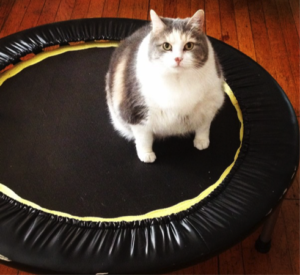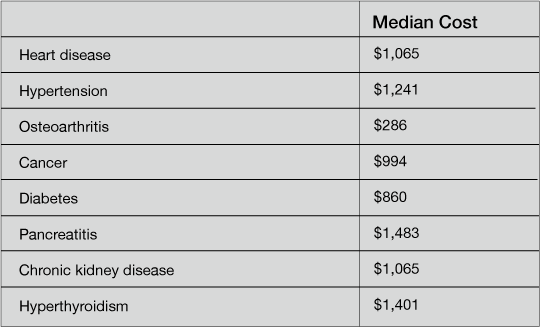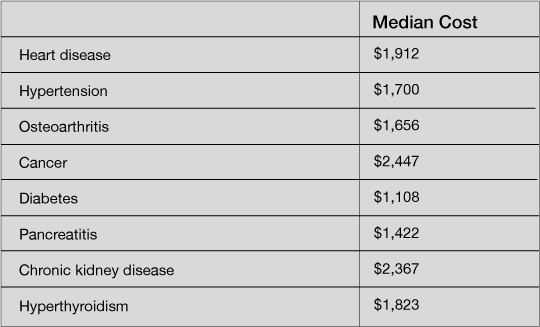
Obesity May Be Costing You Thousands (Even if You're Fit)
- Could you be feeding the newest obesity epidemic? Find out…
- Whoa doggy! Slow down on those treats. It might save your best friends life.
- Plus, a few easy tips to get your buddy slimmed down and keep your money in the bank!
Dear Living Well Daily Reader,
The obesity crisis is costing us billions in the U.S and worldwide.
And if you are a fit taxpayer, you may think it’s not costing you any more than your annual obligatory contribution to the national health care system.
But the things is you might be wrong. Obesity could be costing you thousands more every year — even if you’re fit as a fiddle!
So how is this possible? You’re in good shape, you eat right, you work out and get plenty of sleep. How could this be costing you a penny?
It’s simple —this obesity-driven bank drainer isn’t caused by your health habits. In fact, it has little to do with your body at all (well, except that you may be the hand that feeds it).
The good news is we have some easy tips to help you save some money and maybe even the life of your best friend. We will share these in a bit.
But first, let’s discuss how could this plague could be affecting you, even if you’re in great shape.
You see, the world’s obesity epidemic is long just a human problem — and it’s now ballooning over to our best friends.
Our pets.
![]() Diabetes: Not Just For Humans Anymore!
Diabetes: Not Just For Humans Anymore!
Recently, the Association for Pet Obesity Prevention (APOP) reported that 58 percent of cats and 54 percent of dogs in the U.S. are obese. Since 35.7 percent of American adults are obese, this means our four-legged friends are suffering from obesity at a greater rate than we are! 1,2
And while we might think our cute, cuddly, and slightly chubby pets may appear just as happy as leaner pets, the truth is they might actually be miserable.

When Josie first came to live with me, she weighed 23 lbs. These days, she’s down to 16 lbs!
According to Dr. Joe Bartges, academic director at Cornell University Veterinary Specialists and a member of the APOP, it can even reduce life expectancy and have negative impacts on your little buddy’s quality of life and lead to greater medical complications. He explains:
The reality is obesity kills. Numerous studies have linked obesity with Type 2 diabetes, osteoarthritis, high blood pressure, many forms of cancer, and decreased life expectancy. Our survey validates the notion that we’re seeing more obese pets with more potential medical problems.1
To back up Bartges’ statement, a recent U.K. study conducted by British pet insurer Animal Friends found that a diabetes diagnosis in pets has risen over 900 percent since 2011.
The study officially reports, “Whether this is to do with genetics or the lifestyles of these breeds and their owners is unknown.”
But it’s no stretch of the imagination to think obesity and inactivity likely played roles in this disease spike, just as in humans.
This rings particularly true when you consider one in five dogs doesn’t even get regular walks and a large number of cats are apartment- or housebound. 3
While there is no way to put an amount on the emotional suffering of losing your pet to a preventable disease, there are still the monetary costs to deal with. And let me tell you, it’s a lot more than an extra bag of treats!
![]() Don’t Let Those Extra Treats Break The Bank
Don’t Let Those Extra Treats Break The Bank
A 2009 study done by researchers at Michigan State veterinary hospital indicates that the annual cost for treating just one chronic condition in a pet can cost thousands.
This means if you have one or more obese pets or one pet has more than one chronic disease, your yearly bonus might be blown on insulin for your kitty or arthritis meds for your dog.
Here’s what your bank account could be facing:
Annual Veterinary Costs Associated With Canine Diseases
Source: dvm360.com
Annual Veterinary Costs Associated With Feline Diseases
Source: dvm360.com
It’s important to keep in mind that not all of these diseases are preventable by obesity reduction. However, getting the extra weight off your pet can lower their risk of acquiring a chronic disease.
So how can you get your pet back in shape?
Just like you do — with increased activity and a healthy diet.
Here are some tips to get you started:
- Make Time to ExerciseWalking your dog at a constant pace will help him lost weight. If your pup is too physically restricted to go on walks, try playing ball in the house or yard, even if it’s just for a few minutes a day. Once you get a routine, you will find it’s easier to increase the level of activity.If you have a cat and don’t think walking it is an option, you can always get your kitty moving with toys and lasers. Even large cats benefit greatly from a little playtime.And don’t forget, your animals weren’t designed to be housebound and fed from dishes. If you have a yard or outdoors space, hide some food in the grass and let your little buddy hunt for it. Not only is he working for his food, but he’s also getting a little added exercise.
- Consult Your Vet About Proper Food, Feeding Times, and Portion SizesJust like with human food, some choices are better than others. Be sure to consult your vet to find a food that will be most beneficial for your pet’s health. In addition, be sure you are feeding the proper amounts at the proper time.Unlike humans, most animals don’t get “full”. If your pet is given constantly given food, it will eat it. In my cat’s case, she had endless access to food. Because of this, she ended up weighing 23 pounds and experienced mobility problems. The vet is still baffled at how she didn’t have diabetes.Pet treats can be just as problematic. Some treats are full of processed ingredients and artificial colors and flavors. If your vet gives you the OK, sweet potatoes and carrots make excellent and worry-free pet treats.But most importantly, stop giving your pet table scraps. Humans eat some really weird stuff. Unfortunately, most of it’s bad for your best bud. So unless you have the go-ahead from your vet to feed your pet certain meats or vegetables, don’t give your furry friends anything from the table.
Live well,

Natalie Moore
Managing editor, Living Well Daily
P.S. Send me your pet health questions! Whether you have a cat, dog, bird, or any type of pet, I would love to hear from you. Direct all questions to nmoore@lfb.org
Sources
[2] Overweight and Obesity Statistics
[3] Cases of Diabetes in Cats and Dogs has risen over 900% since 2011
Written By Natalie Moore
Natalie Moore is a dedicated health researcher with a passion for finding healthy, natural, and science-based solutions. After a decade of direct healthcare experience in western and natural medicine, she was involved in public health research before joining Living Well Daily.
View More Free Articles
Weird Tea Trick Calms Your Mind While Boosting Focus
You know the drill… If you want to feel more alert, coffee gives you the jolt you need. But when it’s calm that you seek, chamomile tea soothes you to sleep. But what if you could drink a beverage that can do both at the same time? A natural compound found in certain teas offers...
Can't Shake Negative Thoughts? Check Your GUT First
Everyone struggles sometimes to stay positive or see the bright side of things. It’s part of being human. You might think those negative thoughts start in your brain—but it’s more complicated than that. A simple change to your daily habit can help dial down those negative feelings. New research suggests that this simple strategy could...
Repair Your Gut Barrier With the “Sunshine Cure”
Happy Fourth of July! As you celebrate with sunshine, good food, and great company, don’t forget—those summer rays aren’t just lifting your spirits… they’re also working behind the scenes to protect your gut and boost your health. Your gut health is more important than most people realize. It directly affects your overall well-being—from immunity to...
The 5 Health Numbers Your Doctor Wishes You'd Track
Have you ever been told you should “advocate” for yourself when it comes to your healthcare and wondered what that really means? It’s not just a buzzword—it’s a powerful concept that empowers you to take charge of your own health journey. In fact, it could save your life. Being your own best health advocate starts...
Do THIS Every 20 Minutes to STOP Digital Eye Strain
Our eyes are under assault—they are the true victims of our current digital age. And it’s because we are constantly glued to screens… phones, tablets, computers, TVs—you name it. Unfortunately, that screen time is taking a serious toll. Digital eye strain affects millions worldwide. In fact, up to 50 percent of computer users could develop...
Mailbag: The Calcium Mistake That's Hardening Your Arteries
“What type of calcium is best to take with bisphosphonates for osteoporosis? I know some varieties can build up in arteries. Thanks for the help.” —Bone Builder Hi Builder, When a patient asks me about calcium, I ask them a peculiar question in return… “Ever wonder how elephants and giraffes build and maintain their massive...
Doctor-Approved Method to Ditch Blood Pressure Meds
In a world where drug solutions dominate healthcare, it’s refreshing to discover that best remedies sometimes don’t involve a single pill. A groundbreaking study shows simple relaxation techniques could be your secret weapon against one of America’s deadliest health conditions. Best of all? It’s free, easy to start right away—and your results are bound to...
Trouble Hearing? Your Heart Could Be at Risk
With research exploding and data pouring in, scientists are uncovering some weird (and surprisingly helpful) health connections. Today’s odd couple? Hearing loss and heart failure. Turns out your ears and your ticker are more connected than you ever imagined. A major study published in the journal Heart looked at over 164,000 people for nearly a...
Stay Up Late? It Could Destroy Your Mental Health
If you dread mornings but come alive at night, there’s concerning new research you need to know about. A recent study found that “night owls” are at higher risk for depression. But before you rush to set your alarm to get up with the sun tomorrow, there’s more to the story… Chronotypes are essentially your...
Go from Flabby to Fit with this Common Vitamin
If you’re like many of us, you woke up one day, looked in the mirror, and realized you’re no spring chicken anymore. Even worse—when you weren’t paying attention—it seems you somehow misplaced the muscles of your youth and have gone from fit to flabby. Aging has a way of humbling us like that. But scientists...











